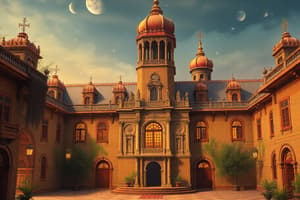Podcast
Questions and Answers
What is the main purpose of compartmentalising history into ancient, medieval, and modern periods?
What is the main purpose of compartmentalising history into ancient, medieval, and modern periods?
- To facilitate better understanding of historical events and developments within specific time frames (correct)
- To emphasize the superiority of certain historical periods over others
- To restrict the study of history to specific time periods
- To limit the scope of historical research and analysis
What is the role of a historian in relation to historical events?
What is the role of a historian in relation to historical events?
- To create fictional stories about historical figures
- To analyze and interpret past events based on historical evidence (correct)
- To focus solely on ancient history
- To ignore the significance of historical evidence
Why is it important to preserve historical sources?
Why is it important to preserve historical sources?
- To ensure that evidence about past events is not lost over time (correct)
- To prevent the study of history from progressing
- To create exclusivity in historical research
- To limit access to historical information
What is the significance of historical sources in understanding the past?
What is the significance of historical sources in understanding the past?
What is the key difference between archaeological and literary sources of history?
What is the key difference between archaeological and literary sources of history?
What is the significance of compartmentalising history into ancient, medieval, and modern periods?
What is the significance of compartmentalising history into ancient, medieval, and modern periods?
Why are the sources of history critical for understanding the past?
Why are the sources of history critical for understanding the past?
What is the main role of an archaeologist in understanding history?
What is the main role of an archaeologist in understanding history?
What is the primary difference between ancient, medieval, and modern periods of history?
What is the primary difference between ancient, medieval, and modern periods of history?
Why do historical sources need to be preserved?
Why do historical sources need to be preserved?
Flashcards are hidden until you start studying
Study Notes
Purpose of Compartmentalizing History
- Compartmentalizing history into ancient, medieval, and modern periods facilitates a clearer understanding of societal changes, technological advancements, and cultural developments over time.
- It allows scholars to focus on specific attributes and events relevant to each era, enhancing educational frameworks.
Role of a Historian
- Historians analyze and interpret past events, providing context and connections between different periods.
- They assess sources for validity, offering narratives that shape our understanding of human experiences and societal evolution.
Importance of Preserving Historical Sources
- Preservation of historical sources is essential for ensuring future generations have access to insights about past societies, cultures, and events.
- It protects the integrity of history, enabling ongoing research and comprehension of human progress.
Significance of Historical Sources
- Historical sources, both primary and secondary, are foundational for constructing knowledge about the past, helping to validate facts and interpret events.
- They act as evidence that informs our understanding of historical narratives and the complexities of previous civilizations.
Difference Between Archaeological and Literary Sources
- Archaeological sources refer to material remains from past societies (artifacts, structures), offering tangible evidence of historical life.
- Literary sources encompass written texts (letters, books, records), providing context and perspectives on historical events from those who lived through them.
Significance of Compartmentalizing History
- Dividing history into distinct periods allows for specialized study and deeper analysis of the unique characteristics and pivotal events of each era.
- It aids in structuring historical learning and research, making complex data more manageable.
Critical Nature of Historical Sources
- Sources of history are vital for reconstructing the past accurately, allowing historians to connect events and societal shifts.
- They serve as the basis for historical interpretation and knowledge dissemination, influencing how history is taught and understood.
Role of an Archaeologist
- Archaeologists focus on uncovering and analyzing physical remnants of past cultures, enhancing narratives surrounding historical development.
- Their work contributes to a broader understanding of human history, bridging gaps left by traditional historical texts.
Primary Differences Between Historical Periods
- Ancient history is characterized by early civilizations and the formation of societal structures; medieval history focuses on feudal systems, religious influence, and the rise of monarchies; modern history highlights industrialization, globalization, and technological advancements.
Need for Preservation of Historical Sources
- Without preservation, valuable historical evidence can be lost, leading to gaps in understanding and potential misinterpretation of history.
- The continuity of knowledge relies on maintaining documents, artifacts, and sites for future exploration and education.
Studying That Suits You
Use AI to generate personalized quizzes and flashcards to suit your learning preferences.





